#kctu
Explore tagged Tumblr posts
Text

From Korean Confederation of Trade Unions (KCTU):
Following the declaration of an indefinite general strike by 1.2 million workers, the KCTU gathered at Gwanghwamun Square on Dec. 4 and launched an all-out resistance movement against the Yoon Seok-yeol administration.
At 6 PM, a rally will be held at Gwanghwamun Square to immediately implement Yoon Seok-yeol's resignation. The rally will conclude with a march to Yongsan.
Watch Live: Resignation of Yoon Seok-yeol for treason! Realization of national sovereignty! Social reform! Let's open a resignation square! Citizens' candlelight
55 notes
·
View notes
Text
2023.11.11 - 전국노동자대회
Yesterday I attended the National Workers' Rally, which is held every year in November in honor of Jeon Tae-il.
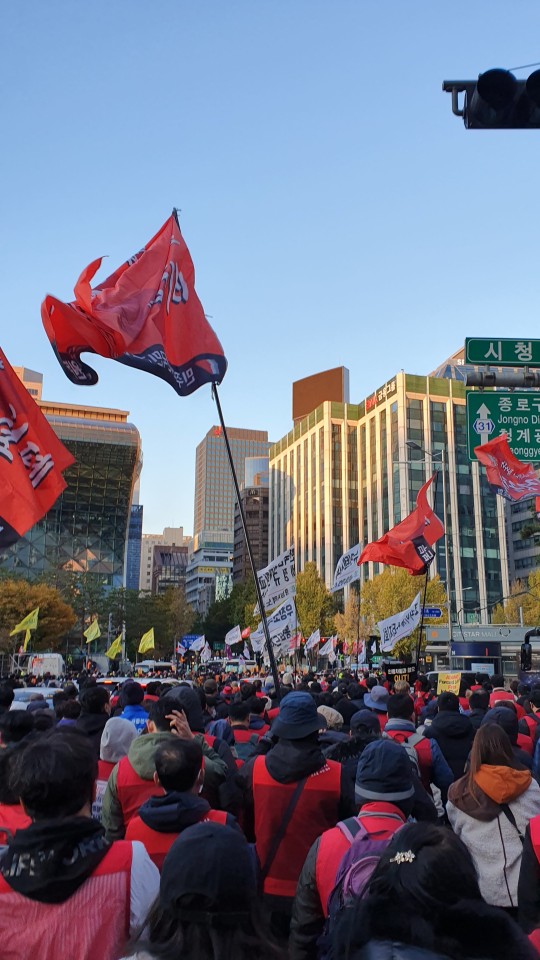

[Image 1: Marching past City Hall; different unions have different colored vests & flags // Image 2: this year's poster]
120만 전태일의 반격! 퇴진광장을 열자!
1,200,000 [number of union members] Jeon Tae-il's counterattack! Let's open the resignation plaza!
노동 - 민생 - 민주 - 평화 파괴 윤석열 정권 퇴진! 전태일열사 정신계송
Destruction of Labor - Livelihood - Democracy - Peace Yoon Seok-Yeol regime, resign! Inherit the spirit of martyr Jeon Tae-il
(Sorry, I don't know how to make these slogans sound good in English lol...)
Who was Jeon Tae-il?
Jeon Tae-il worked in Seoul Peace Market (서울평화시장) in the mid-late 1960s doing sewing & other odd jobs. Although there were laws meant to protect the rights of workers, they weren't enforced. Workers were routinely forced to work unpaid overtime, injected with drugs to keep them awake, and suffered health issues like TB due to the unsanitary environments they had to work in.
In 1969, after learning about the laws, Jeon Tae-il started the first labor organization in the market, 바보회 (the Fool's Association), to educate the other workers about their rights. However, the government under dictator Park Chung-hee responded by cracking down harder on the employees trying to organize.
On November 13th, 1970 Jeon Tae-il set himself on fire and ran through the streets to bring attention to the terrible working conditions. He was 22 years old.
His death was a catalyst for people to unite in the struggle for workers' rights. Factory workers began forming unions and slowly the laws have been enforced/changed to protect workers. The struggle isn't over, though, so every year since 1988 the 전국노동자대회/National Workers' Rally has been held in Seoul.
19 notes
·
View notes
Link
Excerpt
An estimated 25,000 union members took part in the rally in downtown Seoul, causing massive traffic congestion and leading to some 80 noise complaints being filed with the police.
The union falls under the umbrella Korean Confederation of Trade Unions (KCTU).
"Our Constitution guarantees the freedom of assembly and demonstration, and as president, I, too, have respected this," Yoon said.
"However, guaranteeing the freedom of assembly and demonstration does not mean infringements on another person's freedoms and basic rights, or acts disturbing the public order, are justified."
Yoon said the previous administration effectively abandoned its law enforcement duties with regard to illegal rallies and demonstrations, leading to intolerable levels of inconvenience for the people.
"It will be difficult for the people to tolerate the actions of the KCTU during the rally that infringed on people's freedoms and basic rights, and disturbed the public order," he said. "Our government will not neglect or tolerate any form of illegal action."
Related links and notes
South Korean Government Program to Import Filipina Maids - May 2023
Korea: union offices raided - January 2023
The Korean Confederation of Trade Unions (KCTU) had their offices raided twice this week, by the National Intelligence Service (NIS), alleging that members of KCTU violated the National Security Act.
No Letup in Strikes as KCTU Mobilizes - June 2003
The KCTU also held rallies in 18 regions all over the country, demanding the abolition of the National Education Information System (NEIS). The Korean Public Officials Union’s 500 members also held a rally at Jongmyo Park, demanding three labor rights—to organize, negotiate and to take group action.
The 25,000 day and night-shift employees of the Hyundai Motor Company Union each held a four-hour strike. They plan to hold another six-hour strike and to refuse overtime work for two hours on June 26.
The Ministry of Labor said that the two-day strike is predicted to cause a total of W73.6 billion in losses for Hyundai Motors. A Kia Motor factory in Hwaseong will suffer from W1.2 billion in losses, and Ssangyong Motor will suffer a W3 billion loss, for a total of W88 billion in damage to the three firms, the ministry said.
Furthermore, this strike is expected to affect large-scale manufacturers such as Doosan Heavy Industry, Tongil Heavy Industry, Hanjin Heavy Industry, and Hyundai Samho Heavy Industries. The labor unions of most of the companies are to participate in another KCTU general strike on July 2, which could sink the firms’ export plans.
Union Is Ensuring Its Own Demise - January 5, 2003
Workers of Tongil Heavy Industries Co. and Kohap Corporations, which are under court receivership and a debt restructuring program, respectively, are on strike, demanding pay raises and protesting restructuring.
Tongil/S&T?
Tongil was well known for its militant labor union, which led Choi to hesitate about an acquisition at first.
South Korea: More than 100 Trade Unionists Detained - October 2, 1998
Even in South Korea, Few Know Extent of Rev. Moon’s Empire (1988)
Kishida continues shallow MRA-style apologies for war crimes Catholic mass in South Korea demanding President Yoon to resign for “selling out Korea to Japan” The Imperial Ghost in the Neoliberal Machine (Figuring the CIA) - Koichiro Osaka
#Yoon Suk Yeol#korea#south korea#republic of korea#south korean government#government#politics#labor#labor organizing#kctu#leftist politics#protests#right-wing politics#conservative politics#korean politics#south korean politics#Korean Confederation of Trade Unions#tongil heavy industries#tongil heavy industry worker's union
1 note
·
View note
Text
I wonder if the leadership of the KCTU are still the guys who did the Ssangyong Motors strike
3 notes
·
View notes
Text
Protests in Seoul over Yoon Suk-yeol’s arrest
Thousands of people gathered in Seoul on Sunday, braving the heavy snow, to demonstrate either in support of or against the arrest of impeached President Yoon Suk-yeol. With his arrest warrant set to expire at midnight on Monday, tensions were high as political unrest threatened to escalate.
The arrest warrant, linked to allegations of insurrection, will expire soon, prompting protests near Yoon’s official residence. Demonstrators on both sides voiced their opinions, with some calling for his immediate arrest, while others strongly opposed the move.
Yoon became the first sitting president in South Korea’s history to face the prospect of arrest. His controversial attempt to declare martial law on December 3 sparked significant political turmoil, affecting not only South Korea but also its relationship with key allies like the United States.
Court’s decision and legal challenges
On Sunday, the Seoul Western District Court rejected a challenge from Yoon’s legal team. They had argued that the arrest warrant was illegal and invalid. Yoon’s lawyers claim that the Corruption Investigation Office for High-Ranking Officials (CIO) does not have the legal authority to handle insurrection cases. However, reports indicate that the investigation involves a joint effort by both the military and the police. Legal experts argue that this makes the CIO’s involvement legally valid.
Yoon’s legal team plans to file a report with prosecutors, accusing the CIO of illegal actions. They claim that the anti-graft body improperly mobilised police officers to enforce the warrant. The CIO has not yet responded to these allegations.
Supporters and critics rally in the cold
Protests continued into Sunday, despite the freezing temperatures and heavy snowfall. Some protesters had camped out overnight in central Seoul. Leaders of the Korean Confederation of Trade Unions (KCTU), one of the main organisers, said it was necessary to “restore the foundation of our society” by holding Yoon accountable for what they view as his actions against the constitution.
Meanwhile, supporters of Yoon gathered in nearby areas, holding signs such as “We will fight for President Yoon Suk-yeol” and “Stop the Steal”, echoing a phrase used by supporters of Donald Trump after the 2020 U.S. election.
Similar rallies took place on Saturday, with significant turnout and some clashes with the police. Protestors blocked roads, and two people were arrested for assaulting officers. On that same day, the CIO requested that acting President Choi Sang-mok, who serves as the finance minister, order the security service to cooperate with the arrest warrant. However, the finance ministry chose not to comment.
Read more HERE

#world news#news#world politics#south korea#south korea news#south korea martial law#south korea politics#south korea president#yoon suk yeol#protests#martial law#south korean politics#korean politics
0 notes
Text
SEOUL, December 4. /TASS/. All members of South Korea's Cabinet of Ministers have informed the prime minister that they are ready to resign following the declaration and subsequent lifting of martial law, which lasted less than six hours, the Chosun Ilbo newspaper reported.
The prime minister's office confirmed that "all members of the Cabinet of Ministers" have expressed their intention to resign, but the final decision will be made after a meeting at 2:00 p.m. local time (5:00 a.m. GMT).
TASS has compiled the key details of the incident.
Martial law
- The day before, South Korean President Yoon Suk Yeol announced the imposition of martial law.
- He justified his decision by stating that the opposition, which holds the majority of seats in parliament, was paralyzing the work of the executive branch by attempting to impeach its representatives, including key government figures. The South Korean leader emphasized that he was taking these measures to combat "pro-North Korean elements" and to protect the constitutional order.
- Several hours later, parliament voted to lift martial law. Subsequently, when the president promised to reverse his decision, the Cabinet of Ministers supported him.
- All of this occurred in less than six hours.
- Announcing his decision to lift martial law, Yoon Suk Yeol called on parliament to abandon its repeated attempts to impeach the president, as well as its legislative and budgetary schemes.
- Opposition parties, in turn, demanded the president's resignation and threatened to initiate impeachment proceedings.
- South Korea has not been under martial law for 45 years.
Reaction in the country
- Many employees of the South Korean presidential office have expressed their intention to resign, the Yonhap news agency reported. These include senior advisers and secretariat staff.
- All members of the South Korean Cabinet of Ministers have expressed their intention to resign, but the final decision will be made after a meeting at 2:00 p.m. local time (5:00 a.m. GMT).
- The Korean Confederation of Trade Unions (KCTU), the largest labor union in South Korea, has announced an indefinite general strike that could last until the president resigns.
- The leading opposition Democratic Party plans to impeach President Yoon Suk Yeol and Defense Minister Kim Yong Hyun for treason, Yonhap reported.
- Its chairman, Lee Jae Myung, warned that the authorities' actions could provoke North Korea and lead to armed clashes on the Korean Peninsula.
Reaction in the world
- North Korea has not yet commented on the situation in South Korea.
- Events in South Korea have shown that the country is unpredictable in terms of stability, and North Korea is right to be concerned about its security, Russian Foreign Ministry Spokeswoman Maria Zakharova said.
- The Russian Embassy in Seoul called on its compatriots "to remain calm, follow the recommendations of the authorities, and refrain from participating in mass events, especially those of a political nature."
- The UN is monitoring the situation in South Korea closely and with concern, Secretary General’s spokesman St·phane Dujarric said at a briefing.
- The US is in touch with its allies in the Indo-Pacific region about the situation in South Korea, State Department Deputy Spokesman Vedant Patel said at a regular briefing.
- The Washington administration views the lifting of martial law in South Korea positively and expects the country's authorities to resolve controversial issues peacefully, US Secretary of State Antony Blinken said in a statement.
- US businessman Elon Musk called the situation with the introduction and lifting of martial law in South Korea "shocking."
0 notes
Text
0 notes
Text

Los Angeles: Yoon Must Resign protest at the South Korean Consulate, December 4, 2024.
The Korean community and supporters turned out against S. Korean Pres. Yoon's short-lived decree of martial law.
Photo by Scott Scheffer
19 notes
·
View notes
Text
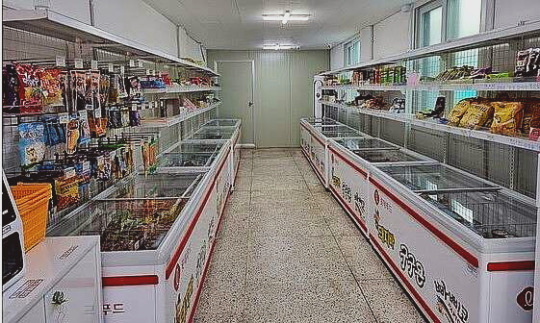
Hàn QuốcCửa hàng không nhân viên là đối tượng yêu thích của đạo chích, tuy nhiên, các ông chủ cho biết thà bị mất hàng còn hơn phải thuê người vì chi phí nhân công quá cao. Ông Kim, một chủ cửa hàng kem không nhân viên �� thành phố Daejeon, cho biết mỗi tháng bắt quả tang 10 vụ trộm chưa kể những vụ không phát hiện được. Số tiền thất thoát dù vậy vẫn ít hơn so với chi phí nhân công. "Biết là sẽ bị mất cắp nhưng ngày càng nhiều người chọn mở cửa hàng không nhân viên", ông Kim nói. Một cửa hàng không nhân viên ở thành phố Daejeon. Ảnh: Lee Byung Jun Năm 2018, Hàn Quốc có 267 hàng kem không nhân viên. Năm 2021, hơn1.400 cửa hàng như vậy đã được mở, theo số liệu từ Ủy ban thương mại. Các cửa hàng không người phục vụ đã tăng gấp 5 lần trong thời gian ba năm, thậm chí còn tăng mạnh hơn nếu gộp cả những cửa hàng tư nhân.Nguồn tin trong ngành tiết lộ với tờ JoongAng Ilbo, dù chưa có thống kê chính thức về số lượng cửa hàng không nhân viên, quy mô tăng trưởng có thể ngang với các cửa hàng nhượng quyền. Dù vậy, vấn đề trộm cắp cũng gia tăng cùng với sự tăng trưởng của mô hình này. Theo cảnh sát Hàn Quốc, từ tháng 3/2021 đến tháng 6/2022, có hơn 6.300 vụ trộm cắp tại các cửa hàng không nhân viên xảy ra, trung bình 13 vụ mỗi ngày.Đây là đối tượng của nhiều đạo chích tuổi teen. Báo chí thường xuyên đưa tin về các vụ thanh thiếu niên đột kích cửa hàng không người phục vụ tại Busan vào sáng sớm. Một số lấy trộm tiền, nhưng nhiều nhất là lấy cắp đồ ăn, bánh bao hay bỏ túi vài que kem, Lee, một chủ cửa hàng tại Sejong, cho biết.Lý do ngày càng nhiều người chọn mở cửa hàng không nhân viên dù dễ bị trộm cắp là chi phí nhân công tăng cao. Năm nay, lương tối thiểu theo giờ tại Hàn Quốc là 9.620 won (gần 177.000 đồng), tăng 15% so với năm 2019.Hai công đoàn lớn nhất là Liên đoàn công đoàn Hàn Quốc (FKTU) và Liên minh công đoàn Hàn Quốc (KCTU) đang yêu cầu tăng lương tối thiểu thêm 25% vào năm 2024. Lee, ông chủ 37 tuổi của hàng kem không nhân viên tại Seoul, chia sẻ đã nghĩ về việc thuê nhân viên...

0 notes
Text
South Korean Government Program to Import Filipina Maids
Tweets from Raphael Rashid (koryodynasty)
The South Korean government is considering a pilot programme to import Filipina maids to Seoul later this year to ease childcare burdens and address the low birthrate problem. But concerns have been raised about forced labour and impact on local workers. https://www.news1.kr/articles/5041042
Bringing foreign nannies and housekeepers to South Korea to help increase the country's birthrate is not a new idea. Recently, the proposal sparked outrage when politicians wanted them to be exempt from the minimum wage. https://www.theguardian.com/world/2023/mar/30/foreign-maids-and-no-military-service-south-korea-criticised-over-ideas-to-boost-birthrate
Under the new proposal, the maids would be subject to the minimum wage, which is KRW 9620/hour, and the plan is to have them commute to and from work instead of living in their employers' homes.
The monthly salary for working 8 hours/day, 5 days/week, incl. holidays, is around 2 million won, which is less than the salary for Korean or Chinese domestic workers, the latter of whom in particular are already subject to discrimination and human rights abuses.
The Korean Confederation of Trade Unions (KCTU) has demanded that the government scrap the idea, raising concerns about the labour rights of female migrant workers and the quality of care for children. http://nodong.org/statement/7814948
It said that the visa under which the women would enter, the E-9, which is typically reserved for low-skilled workers, is a form of modern-day slavery with weak labour rights protections, and that women are exposed to sexual violence due to limited ability to move workplace.
The KCTU also raised the issue of potential exploitation and abuse given their vulnerable position as non-native speakers and foreigners in an unfamiliar culture.
The focus for now seems to be on bringing maids from the Philippines, and other Southeast Asian countries. Critics are saying their introduction would undercut the existing market leading to job losses, and that the government should focus on nurturing workers at home.
Other concerns are that if foreign maids are paid minimum wages and commute from their homes, they will not be able to save much money after house and commute expenses are deducted. https://english.hani.co.kr/arti/english_edition/e_national/1091243.html
More importantly, there are concerns that such a system would fail to address the issue at hand: the low birthrate. Seoul Mayor Oh Se-hoon is the most vocal supporter of this proposal, expressing a strong desire to bring in foreign domestic workers.
In a Facebook post, Oh agreed with Nobel laureate Michael Kremer, a professor at the University of Chicago, who believes that Korea needs an immigration policy that includes a special visa programme for foreign domestic workers, similar to Hong Kong and Singapore.

While such a system would undoubtedly benefit some families who already have children or those who definitely want children, it is unclear whether the birthrate would actually increase. Singapore and Hong Kong have some of the world's lowest birth rates.
#the philippines#philippines#migrant workers#migration#south korea#republic of korea#exploitation#human rights#human rights abuses#labor organizing#kctu#Korean Confederation of Trade Unions#workers#women#activism#korean politics#south korean government#politics#south korean politics#asia
1 note
·
View note
Text

Wouldn't that be nice
kpop idols should unionise
#funny and real in theory but . to me kind of tone deaf after yang hodong's self immolation#sorry to seriouspost on your joke but i see this 'idols should unionise' thing all th time and its just like. well only if it was that easy#especially when we see stuff like the WGA and that actors and musicians in americas have unions#but that freedom isn't afforded to koreans. so it makes me kind of sad that people think its just a matter of doing it#this is not 2 be a hater or sound mean btw just! i think is important for anybody who consumes kculture to know
657 notes
·
View notes
Text
Just read what it is about today - "Unionized workers affiliated with the Korean Confederation of Trade Unions (KCTU) plan to strike in Seoul, May 16-17. The purpose of the 48-hour strike is to address various issues, including commemorating the death of a construction official who committed suicide, as well as calling for the resignation of President Yoon Suk Yeol."
0 notes
Text
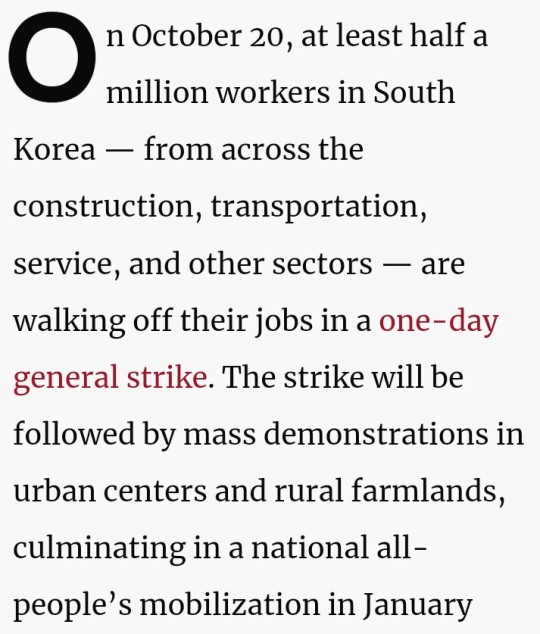
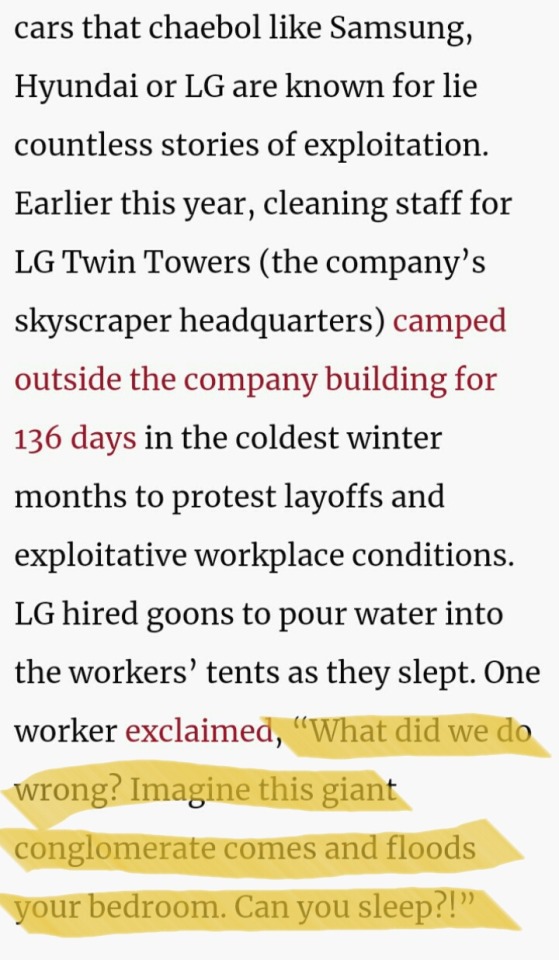

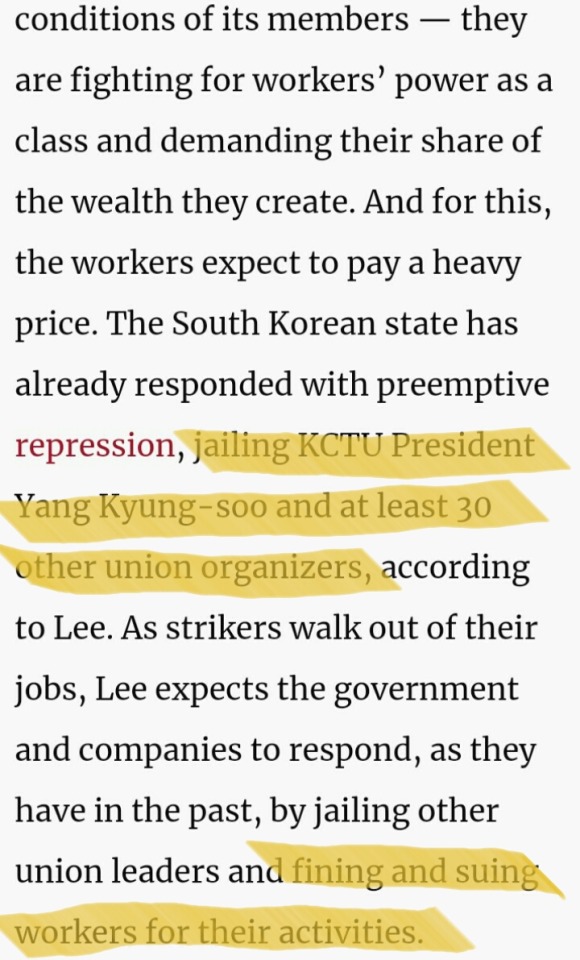
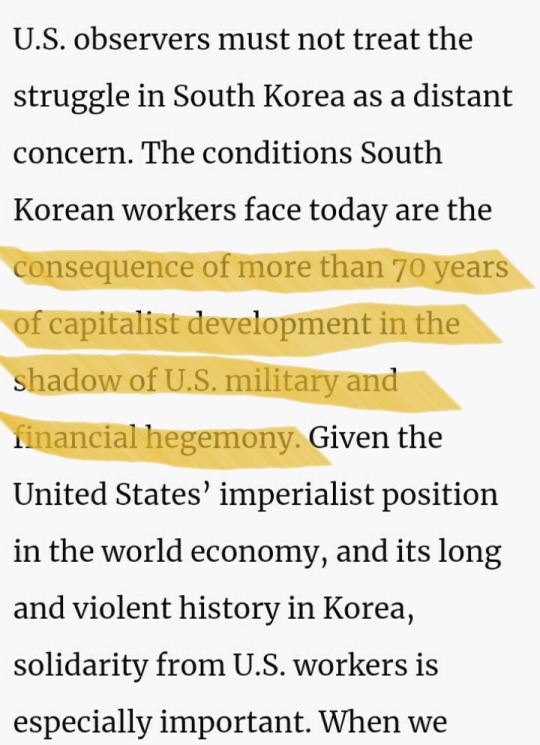

#south korea#general strike#workers strike#kctu#covid 19#jay rambles#long post#just thought it was a good thing to read n share#politics#working class
27 notes
·
View notes
Text
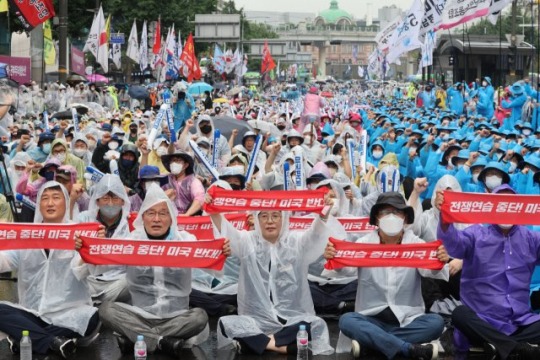
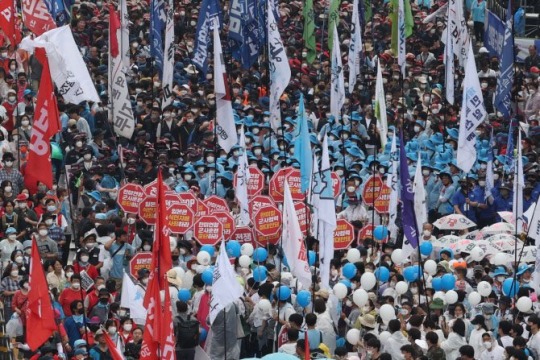
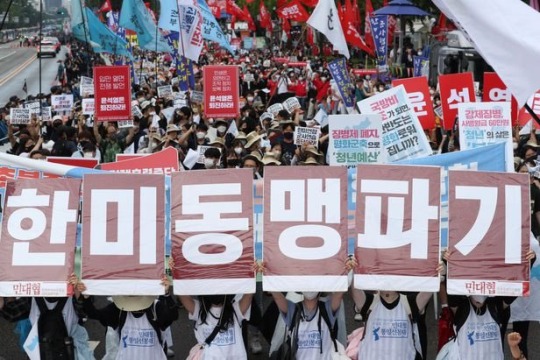
A massive anti-US rally was held in Seoul on August 13th 2022. The participants demanded the South Korean government stop the South Korea-U.S. joint military exercises scheduled for this month, and called for the dissolution of the SK-U.S. alliance and the withdrawal of US forces in S.Korea.
Yang Kyung-soo, chief of the Korean Confederation of Trade Unions (KCTU), a major umbrella labor union of South Korea, said at the protest rally that staging military exercises in preparation for a war is tantamount to intending to wage a war, according to local newspaper Chosun Ilbo.
67 notes
·
View notes
Text
[1일 1포 - 25/28]
Went to a union meeting today, so here are some words more or less related (in my mind, at least)
노동조합 (노조) - labor union
전국민주노동조합총연맹 (민주노총) - Korean Confederation of Trade Unions (KCTU) [this one is more left-leaning]
한국노동조합총연맹 (한국노총) - Federation of Korean Trade Unions (FKTU) [this one is more right-leaning]
노동자, 근로자 - worker
조합비 - union dues
강령 - a creed, doctrine
(총)파업 - (general) strike
시위 - protest, demonstration
선언하다 - to declare, proclaim
연대하다 - to be in solidarity, unity
인권 - human rights
최저임금 - minimum wage [currently 9,620원 = $7.31]
근로자의 날 (5월 1일) - Labor Day, Workers' Day (May 1st)
민주주의 - democracy
자본주의 - capitalism
사회주의 - socialism
공��주의 - communism
And these are the political parties that are generally supportive of the KCTU: 진보당 (Progressive Party), 노동당 (Labor Party), 정의당 (Justice Party), 녹색당 (Green Party)
#langblr#studyblr#language learning#korean#Korean language#there is power in a union#politics#vocabulary#korean vocabulary#korean langblr#feb 1일 1포
8 notes
·
View notes